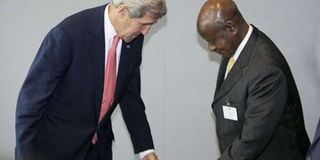Opposition disunity hands Museveni gains

US Secretary of State John Kerry meets with Uganda President Yoweri Museveni at the United Nations headquarters on September 27, 2015. Uganda opposition has substantial ground to cover if it is to oust the country’s president of thirty years. PHOTO | DOMINICK REUTER | AFP
What you need to know:
- As a result, the opposition enters the election divided and weakened, rendering the re-election of President Museveni and the National Resistance Movement (NRM) an increasingly likely outcome.
- The significance of opposition factionalism was evident during a recent research trip to Gulu in northern Uganda. In the first multi-party election, Gulu and the larger Acholi area, constituted a key opposition stronghold.
- The opposition has substantial ground to cover if it is to oust the country’s president of thirty years.
Last week, Uganda’s most prominent opposition politicians and parties – which had coalesced around The Democratic Alliance (TDA) – failed to agree on a single presidential candidate for next February’s election.
As a result, the opposition enters the election divided and weakened, rendering the re-election of President Museveni and the National Resistance Movement (NRM) an increasingly likely outcome.
TDA was formed in June. Initially, Kizza Besigye of the Forum for Democratic Change (FDC), appeared to be the TDA’s obvious flagbearer due to his long-standing struggle to oust Museveni (which has seen him tear-gassed, beaten and detained) and position as the official leader of the opposition.
The question was complicated, however, when former Prime Minister Patrick Amama Mbabazi joined the opposition’s free and fair election campaign, and announced that he would also run for the presidency.
OPPOSITION STRONGHOLD
In brief, while Besigye has proven unable to oust Museveni in the country’s last three elections, many felt that Mbabazi – with Besigye’s backing – would be able to divide the NRM support base and mobilise existing opposition supporters, and that, as a recent NRM insider, he would bring important strategic insights and finances to the opposition’s campaign.
The fact that the TDA has proved unable to agree on a joint candidate has led some to conclude that the opposition was more interested in ousting Museveni and acquiring power for themselves, than in bringing about substantive change.
This perception is further fuelled by the fact that both Mbabazi and Besigye are former NRM leaders; Besigye having previously served as the NRM’s National Political Commissar before he joined the opposition in the early 2000s.
The significance of opposition factionalism was evident during a recent research trip to Gulu in northern Uganda. In the first multi-party election, Gulu and the larger Acholi area, constituted a key opposition stronghold.
In part, this was due to the war and widespread perception of atrocities committed by military personnel and historic marginalisation.
ELECTORAL MALPRACTICE
However, in 2011, Museveni secured a slight majority in the area. This is generally attributed to the end of the war and subsequent peace, various development projects, Museveni’s use of state resources to mobilise support, and, perhaps, a degree of electoral malpractice.
Last year, a local by-election suggested that Museveni’s gains would be short-lived after the Woman MP for Amuru, Betty Bigombe, vacated her post, and the NRM lost the seat to the FDC’s Lucy Akello.
Significantly, the opposition united behind Akello in the election, as leading FDC politicians were joined on the campaign trail by Olara Otunnu of the Uganda People’s Congress and the Democratic Party’s Norbert Mao.
The by-election highlighted the power of a united opposition.
However, with the possibility of a similarly united opposition campaign for the presidential ticket fading into the background, a common question has become why Museveni would lose in February 2016 when he has been able to beat a divided opposition to date.
As a result, while there is still a long way to go until next February’s election, Museveni’s position has clearly been strengthened by the TDA’s collapse. The opposition has substantial ground to cover if it is to oust the country’s president of thirty years.





